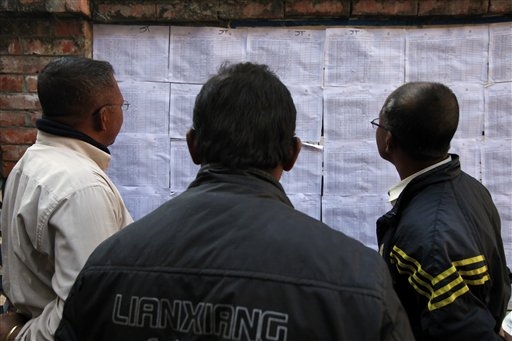
KATMANDU, Nepal (AP) — An explosion wounded three people including a 8-year-old boy outside a polling station Tuesday in Nepal's capital where voters lined up to elect a Constituent Assembly they hope will be able to draw up a constitution to bring stability to the Himalayan nation.
Candidates from more than 100 political parties and several more independent ones are competing in the election. The assembly will also double as the parliament and choose a government. Nepal has 12 million registered voters.
Police said voters were waiting outside the polling station in the heart of Katmandu when the bomb exploded.
Eyewitness Ram Dangol said the child was playing the alley when the blast happened. The injured were rushed to hospitals.
Separately, police fired iin the air to disperse a group of activists who attacked polling station in a village 400 kilometers (250 miles) west of Katmandu. Chief government administrator of Dailekh district Homnath Thapaliya said police were in control of the station but a dozen voters who hurt trying to flee the scene.
Earlier, explosions rocked the capital Katmandu and other cities on Monday night. Two people were injured in the explosion in Katmandu. Police believe the two men were supporters of an alliance of 33 opposition parties which have been attempting to disrupt the election.
The government called a four-day public holiday so voters could return to their villages in the mountainous country.
However, the alliance of 33 opposition parties has been enforcing a nine-day transport blockage to stop voters from reaching their remote villages. They are upset at the appointment of a Supreme Court judge-led government in March, saying the larger parties have kept them out of the decision making leading up to the election.
The last Constituent Assembly was elected in 2008, following the end of a 10-year Maoist insurgency and the overthrow of the centuries-old monarchy.
But the assembly was riven by infighting and never finished its work. The result is a power vacuum that has left the country without a proper constitution for nearly seven years.
Some of the disagreements center on whether to divide the country into a federal system based on ethnic groups or strictly by geography. But the parties mostly squabble over who gets to lead the country.
Analysts are predicting none of the political parties are likely to get a majority in the election. But any coalition government formed between two or more parties would have a difficult the task of writing a constitution because each clause requires approval from two-thirds of the assembly, in a country with more than 100 ethnic groups and languages.
The United Communist Party of Nepal (Maoist), the party of former communist rebels, is hoping to repeat the last election and emerge as the largest party. Its main competitors are the Nepali Congress and Communist Party of Nepal (United Marxist Leninist).
In Washington, State Department spokeswoman Jen Psaki said holding successful elections would help cement the peace process that was started in 2006.